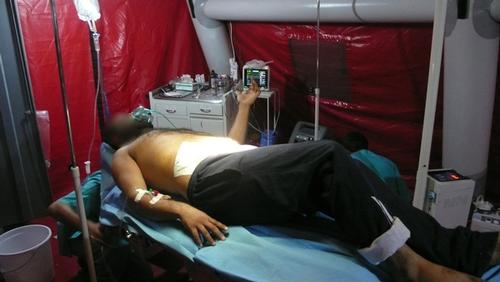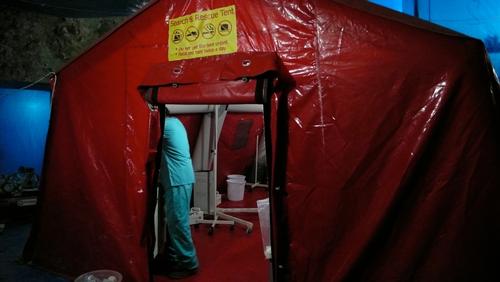- Dr Martial Ledecq is a surgeon who is just back in Belgium from a one-month mission in one of the four makeshift medical facilities set up by MSF in the north of Syria.
- Since the end of June 2012, MSF teams have treated more than 2,500 patients and carried out some 550 surgical procedures.
Can you describe your work in Syria?
I worked for a month as a surgeon in a makeshift hospital set up by MSF in the north of Syria. Our facility comprised an operating theatre and a ten-bed ward. We were performing emergency surgery and providing medical consultations for the local population. In one month, we carried out approximately 70 procedures in the operating theatre, at times more than two a day. It really is a drop in the ocean of medical destitution that’s currently overwhelming Syria. Some days, we’d be treating a few minor cases, and then suddenly, we would be confronted with a massive influx of wounded. Apart from a few normal surgical emergencies, these procedures were all carried out on patients with violence-related injuries: gunshot or shrapnel wounds, open fractures, injuries caused by explosions. Our patients include women and children, and combatants from various opposition groups and also from government forces.
What other treatment options do the people have?
When for security reasons people cannot cross to Turkey, ours was the only functioning surgical unit in the region. Even before the conflict, the people in this medically impoverished rural area were forced to travel long distances to find medical care in an urban centre. But now, with the conflict, these routes are impossible. That is why, for example, during my time there, we had to carry out two emergency Caesarean sections.
How were the working conditions?
We had to work in difficult conditions. We were in a huge cave that had previously been fitted out to store fruit, vegetables and fuel. The challenge was to create the necessary environment for a real medical and surgical unit. We had to work on getting a supply of water and electricity, and guarantee the best possible sterile conditions. We set up an inflatable hermetically-sealed tent as the operating theatre. It didn’t look good, but we managed to create a healthcare facility in a very rural region at the foot of a remote hill. It was an enormous logistical challenge.
What were the difficulties you faced?
The main challenge was treating a major influx of wounded in a very short space of time in a small facility with few staff. MSF has protocols for such mass casualty situations, but in these conditions it was difficult to put them into practice. Triage of the wounded in order to identify medical and surgical priorities often proved problematic in a facility with only one operating theatre, one anaesthetist and one surgeon. Another obstacle was working with material bought on the local market and which was below MSF quality standards. At that time, we did not have an import licence. However, our main asset was the extraordinary cooperation of the Syrian staff who joined us, and the quick-thinking approach that prevailed among the expatriate team.
In your opinion, what is the main challenge of this type of emergency response?
We really want to offer the same services on both sides of the fault line that currently divides Syria, but our healthcare unit was located in an area controlled by armed opposition groups. As a humanitarian organisation we keep underscoring how we are neutral and impartial, so how can we justify being unilaterally located on only one side of the conflict? For me, this was the humanitarian challenge of this type of response work. However, even though MSF is currently only working geographically on one side of the conflict, we are staying true to our humanitarian principles. In addition to many civilians, we treated both wounded rebel fighters and soldiers from the Syrian army who had been taken prisoner. We constantly had to explain the basic principles of humanitarian law to our contacts.
Barrel bombs are being dropped randomly. Sometimes they land in orchards without claiming any victims, but sometimes they fall on houses.Dr Martial Ledecq, surgeon
Did it feel dangerous?
Occasionally, yes. When a helicopter flew overhead, for twenty minutes or so, you couldn’t help but wonder what might happen. One day, a bomb fell 60 metres away from our makeshift hospital. I was right in the middle of an operation. At times likes those, you are very focused and are probably less aware of the reality of the danger.
What is the level of violence against the people?
I’m not sure how easy it is to have a scale of violence. We saw all kinds of injuries: a man came in with a bullet in his head, another with a bullet in his mouth. There was a wounded prisoner who was in an unbelievable state of mind. When he was on our operating table, he was still begging us to spare his life! War is never pretty.
What about the collateral victims?
Yes, there are civilians who are both direct and indirect victims of the conflict. Direct victims, like the old lady with shrapnel wounds to the leg. Barrel bombs are being dropped randomly. Sometimes they land in orchards without claiming any victims, but sometimes they fall on houses. When I was there, in one of the houses hit, three children were killed, buried by rubble. Outside, four adults were burned and riddled with shrapnel. I can still hear the cries of revolt and despair of the three children’s mother. This type of thing happened twice. And then, there are the indirect victims, like the two little girls burned when their house caught fire, because there has not been any electricity since the start of the conflict and they relied on candle light. One died and the other will be permanently disfigured. If the power had not been out because of the conflict, this would never have happened.
In this heavily polarised conflict, how can we ensure the neutrality of our facilities?
The violence is contagious, but so is kindness that is shown to all. Whether it was through formal dialogue with one or other head of the armed groups, or through the daily treatment delivered with the same attention to all, regardless of their political or religious opinions, our Syrian co-workers quickly understood that we were neutral in this conflict. Despite this heavily polarised conflict, it has been possible to make our healthcare unit a peaceful facility where simple gestures of solidarity can be made, and to restore dignity to the wounded, whatever their background.





